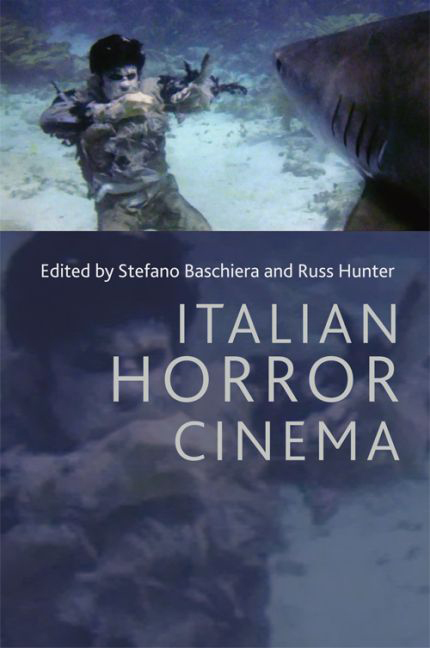Book contents
- Frontmatter
- Contents
- List of figures
- List of contributors
- Acknowledgements
- Introduction
- 1 Preferisco l'inferno: early Italian horror cinema
- 2 Domestic films made for export: modes of production of the 1960s Italian horror film
- 3 The 1980s Italian horror cinema of imitation: the good, the ugly and the sequel
- 4 Knowing the unknown beyond: ‘Italianate’ and ‘Italian’ horror cinema in the twenty-first century
- 5 Bavaesque: the making of Mario Bava as Italian horror auteur
- 6 The Argento Syndrome: aesthetics of horror
- 7 Scrap metal, stains, clogged drains: Argento's refuse and its refusals
- 8 The giallo /slasher landscape: Ecologia del delitto, Friday the 13th and subtractive spectatorship
- 9 Kings of terror, geniuses of crime: giallo cinema and fumetti neri
- 10 Political memory in the Italian hinterland: locating the ‘rural giallo’
- 11 The horror of progressive rock: Goblin and horror soundtracks
- 12 ‘The only monsters here are the filmmakers’: animal cruelty and death in Italian cannibal films
- 13 Italian horror cinema and Italian film journals of the 1970s
- Index
12 - ‘The only monsters here are the filmmakers’: animal cruelty and death in Italian cannibal films
Published online by Cambridge University Press: 12 September 2017
- Frontmatter
- Contents
- List of figures
- List of contributors
- Acknowledgements
- Introduction
- 1 Preferisco l'inferno: early Italian horror cinema
- 2 Domestic films made for export: modes of production of the 1960s Italian horror film
- 3 The 1980s Italian horror cinema of imitation: the good, the ugly and the sequel
- 4 Knowing the unknown beyond: ‘Italianate’ and ‘Italian’ horror cinema in the twenty-first century
- 5 Bavaesque: the making of Mario Bava as Italian horror auteur
- 6 The Argento Syndrome: aesthetics of horror
- 7 Scrap metal, stains, clogged drains: Argento's refuse and its refusals
- 8 The giallo /slasher landscape: Ecologia del delitto, Friday the 13th and subtractive spectatorship
- 9 Kings of terror, geniuses of crime: giallo cinema and fumetti neri
- 10 Political memory in the Italian hinterland: locating the ‘rural giallo’
- 11 The horror of progressive rock: Goblin and horror soundtracks
- 12 ‘The only monsters here are the filmmakers’: animal cruelty and death in Italian cannibal films
- 13 Italian horror cinema and Italian film journals of the 1970s
- Index
Summary
Many contemporary horror filmmakers pride themselves on violating taboos in their films, especially taboos concerning violence. However, there is a line that even many of the most hardened filmmakers refuse to cross: violence against animals. In fact, some horror filmmakers have spoken out against animal abuse. For instance, heavy metal musician-turned-horror filmmaker Rob Zombie, director of House of 1000 Corpses (2003), The Devil's Rejects (2005) and the remake of Halloween (2007), teamed up with the organisation People for the Ethical Treatment of Animals (PETA) in 2007 to record a message for their ‘Thanksgiving Hotline’, a ‘compassionate alternative’ to the Butterball Turkey Talk Line that offers tips on turkey preparation. Zombie is a self-described ‘ethical vegetarian’ and as such his contribution details the cruelty and mistreatment to which turkeys are subjected in Butterball's factory farms (PETA, 2007). In 2009 another horror filmmaker, Eli Roth, director of the Hostel films (2006–7), appeared in a promotional spot for PETA. More lighthearted than Zombie's message but no less serious, the promo features Roth being squeezed by a large snake puppet as he says to the camera: ‘While violence in the movies is make-believe, sadly violence against animals is all too real … So, let's leave the violence where it belongs: on the screen.’
Zombie's and Roth's attitudes towards animal violence differ significantly from those exhibited by Italian exploitation directors such as Umberto Lenzi, Ruggero Deodato and Sergio Martino. These filmmakers had an undeniable influence on contemporary horror filmmakers – especially Roth, who featured Deodato in a cameo in Hostel: Part II (2007), provided a video introduction for the 2011 DVD release of Martino's I corpi presentano tracce di violenza carnale/Torso (1973), and paid homage to the Italian cannibal sub-genre with his film The Green Inferno (2013). However, these Italian directors took an extremely different position on violence towards animals, as several of their films feature graphic footage of real animal torture, mutilation and death. The cycle of cannibal films made by Italian exploitation filmmakers lasted roughly from the early 1970s to the early 1980s and consists largely of what are undoubtedly some of the most controversial films in world cinema, depicting white Westerners confronted in the jungle by indigenous cannibalistic tribes.
- Type
- Chapter
- Information
- Italian Horror Cinema , pp. 191 - 206Publisher: Edinburgh University PressPrint publication year: 2016



